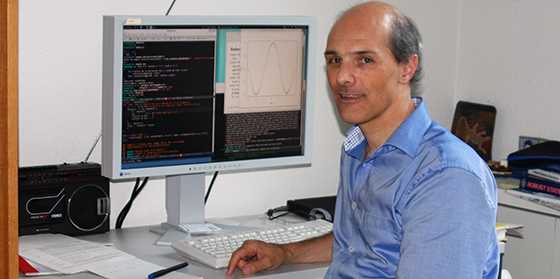The R pioneer
Martin Mächler has worked at the Seminar for Statistics for 30 years. During this time, he has conducted pioneering work: Mächler is the co-inventor of the R statistics programming language.
While others wanted to become train drivers in the 1960s, one thing was always clear to Martin Mächler: he wanted to become a researcher. And that also did not change while he was at secondary school. If he was not learning mathematics, he was tinkering with computer programs. And that at a time when hardly anyone had a computer.
"Only very few nerds were interested in computer sciences back then," he remembers. When the time came to decide on what to study, it soon became clear: "I wanted to go to ETH." Computers were already being used at that time there on mathematics degree courses. "That wouldn't have been possible at university."
Although he later wrote his diploma thesis in mathematical numerics, Mächler was attracted to statistics for his doctorate. This choice was again triggered by the possibility of working with computer programs. But there were other reasons, too: "I have always been fascinated by the fact that statistics enable me to come into contact with a wide range of other areas such as biology or medicine."
Something meaningful for mankind
More than 30 years have passed since he started writing his doctorate. He has come a long way since that time. Having been to the US for two years with his wife and two boys to conduct research, he returned to the Seminar for Statistics and subsequently examined the areas of robust statistics and curve estimates. Another achievement made him world famous: the co-development of R, a programming language for statistical calculation and statistical graphics.
Today, R is one of the best-known tools of statistical research in the world. Not least because it is free of charge and its source code is available to everyone, which is known as open source. This was one of the reasons why the statistician joined the R project in 1995: "Because I was on the pioneering team and it was open source, we were able to carry out analyses with R already at an early stage." His pioneering work did not make him rich.
It was more important to him that everyone should have open access to the source code. "I wanted to create something meaningful for mankind." And he has: today, universities in the poorest countries benefit from the open source access in particular. Martin Mächler is 54 years old. Currently, he is occupied with his teaching of computational statistics.
Anniversaries
October/November 2013
30 years
Dr. Martin Mächler, Seminar for Statistics (SfS)
Dr. Erich Christian Meister, Laboratory of Physical Chemistry
Rudolf Pfenninger, Laboratory of Ion Beam Physics (LIP)
Johannes Schlaefli, Rectorate
25 years
Madeleine Völlmin, ETH library (ETH Bibliothek)
Dr. Diethelm Würtz, Institute for Theoretical Physics
20 years
Sagrario Ares-Bande, Facility Management
Harald Lehmann, Institute of Polymer Physics
Dr. Pia Wyrsch, Student Administration (Studienadministation)
15 years
Dr. Sabina Yolanda Keller, Institute of Agricultural Sciences
Dr. Jan Laue, Institute for Geotechnical Engineering
Corina Niescher, Human Resources Consulting
Thomas Richter, ITS User Services
10 years
Gabrielle Ruth Attinger, Department of Environmental Systems Science
Walter Bachmann, Laboratory for Solid State Physics
Thomas Bähler, Laboratory for Solid State Physics
Dr. Werner Eugster, Institute of Agricultural Sciences
Dr. Marcel Guillong, Chair of Magmatic Petrology
Emil Haefliger, Facility Management
Roy Hunziker, Physics Mechanical Workshop (Werkstatt HPF)
Claudia Marianne Jenny, Chair of Sociology
Maria Carmela Monaldo, Material Administration D-CHEM (Materialverwaltung D-CHEM)
Giovanni Salemme, Department of Health Sciences and Technology
Irene Urbanetti, Institute for Theoretical Physics
Frank Gunther Wienhold, Institute for Atmospheric and Climate Science
Retirements
Dr. Ulrich Max Bangerter, Department of Environmental Systems Science, ETH library
Marcel Brunner, Services
Heidi Demuth, Chair of Entrepreneurial Risks
Karl Joos, Events and Location Development, Coordination and Administration
Juraj Lipscher, Empirical Research on Learning and Instruction
Rajni Malhotra, Institute for Astronomy
Patrick Ochsner, Accounting
Rudolf Seiler, Department of Architecture
Paul Studerus, Laboratory for Solid State Physics
Deaths
Mr Werner Lechthaler, Facility Management, passed away on 17.08.2013.

